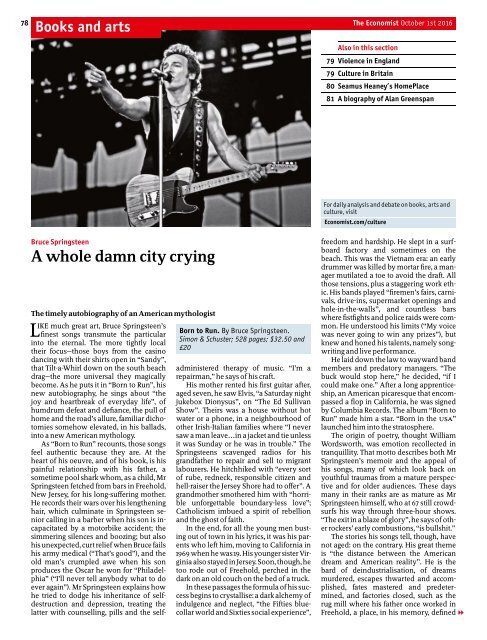Create successful ePaper yourself
Turn your PDF publications into a flip-book with our unique Google optimized e-Paper software.
Books and arts<br />
78 <strong>The</strong> <strong>Economist</strong> October 1st 2016<br />
Also in this section<br />
79 Violence in England<br />
79 Culture in Britain<br />
80 Seamus Heaney’s HomePlace<br />
81 A biography of Alan Greenspan<br />
For daily analysis and debate on books, arts and<br />
culture, visit<br />
<strong>Economist</strong>.com/culture<br />
Bruce Springsteen<br />
A whole damn city crying<br />
Born to Run. By Bruce Springsteen.<br />
Simon & Schuster; 528 pages; $32.50 and<br />
£20<br />
administered therapy of music. “I’m a<br />
repairman,” he says ofhis craft.<br />
His mother rented his first guitar after,<br />
aged seven, he saw Elvis, “a Saturday night<br />
jukebox Dionysus”, on “<strong>The</strong> Ed Sullivan<br />
Show”. <strong>The</strong>irs was a house without hot<br />
water or a phone, in a neighbourhood of<br />
other Irish-Italian families where “I never<br />
saw a man leave…in a jacket and tie unless<br />
it was Sunday or he was in trouble.” <strong>The</strong><br />
Springsteens scavenged radios for his<br />
grandfather to repair and sell to migrant<br />
labourers. He hitchhiked with “every sort<br />
of rube, redneck, responsible citizen and<br />
hell-raiser the Jersey Shore had to offer”. A<br />
grandmother smothered him with “horrible<br />
unforgettable boundary-less love”;<br />
Catholicism imbued a spirit of rebellion<br />
and the ghost offaith.<br />
In the end, for all the young men busting<br />
out of town in his lyrics, it was his parents<br />
who left him, moving to California in<br />
1969 when he was19. His youngersisterVirginia<br />
also stayed in Jersey. Soon, though, he<br />
too rode out of Freehold, perched in the<br />
darkon an old couch on the bed ofa truck.<br />
In these passages the formula ofhis success<br />
begins to crystallise: a darkalchemy of<br />
indulgence and neglect, “the Fifties bluecollarworld<br />
and Sixtiessocial experience”,<br />
<strong>The</strong> timely autobiography of an American mythologist<br />
LIKE much great art, Bruce Springsteen’s<br />
finest songs transmute the particular<br />
into the eternal. <strong>The</strong> more tightly local<br />
their focus—those boys from the casino<br />
dancing with their shirts open in “Sandy”,<br />
that Tilt-a-Whirl down on the south beach<br />
drag—the more universal they magically<br />
become. As he puts it in “Born to Run”, his<br />
new autobiography, he sings about “the<br />
joy and heartbreak of everyday life”, of<br />
humdrum defeat and defiance, the pull of<br />
home and the road’s allure, familiar dichotomies<br />
somehow elevated, in his ballads,<br />
into a new American mythology.<br />
As “Born to Run” recounts, those songs<br />
feel authentic because they are. At the<br />
heart of his oeuvre, and of his book, is his<br />
painful relationship with his father, a<br />
sometime pool shark whom, as a child, Mr<br />
Springsteen fetched from bars in Freehold,<br />
New Jersey, for his long-suffering mother.<br />
He records their wars over his lengthening<br />
hair, which culminate in Springsteen senior<br />
calling in a barber when his son is incapacitated<br />
by a motorbike accident; the<br />
simmering silences and boozing; but also<br />
his unexpected, curt reliefwhen Bruce fails<br />
his army medical (“That’s good”), and the<br />
old man’s crumpled awe when his son<br />
produces the Oscar he won for “Philadelphia”<br />
(“I’ll never tell anybody what to do<br />
ever again”). Mr Springsteen explains how<br />
he tried to dodge his inheritance of selfdestruction<br />
and depression, treating the<br />
latter with counselling, pills and the selffreedom<br />
and hardship. He slept in a surfboard<br />
factory and sometimes on the<br />
beach. This was the Vietnam era: an early<br />
drummer was killed by mortar fire, a manager<br />
mutilated a toe to avoid the draft. All<br />
those tensions, plus a staggering work ethic.<br />
His bands played “firemen’s fairs, carnivals,<br />
drive-ins, supermarket openings and<br />
hole-in-the-walls”, and countless bars<br />
where fistfights and police raids were common.<br />
He understood his limits (“My voice<br />
was never going to win any prizes”), but<br />
knew and honed his talents, namely songwriting<br />
and live performance.<br />
He laid down the law to wayward band<br />
members and predatory managers. “<strong>The</strong><br />
buck would stop here,” he decided, “if I<br />
could make one.” After a long apprenticeship,<br />
an American picaresque that encompassed<br />
a flop in California, he was signed<br />
by Columbia Records. <strong>The</strong> album “Born to<br />
Run” made him a star. “Born in the USA”<br />
launched him into the stratosphere.<br />
<strong>The</strong> origin of poetry, thought William<br />
Wordsworth, was emotion recollected in<br />
tranquillity. That motto describes both Mr<br />
Springsteen’s memoir and the appeal of<br />
his songs, many of which look back on<br />
youthful traumas from a mature perspective<br />
and for older audiences. <strong>The</strong>se days<br />
many in their ranks are as mature as Mr<br />
Springsteen himself, who at 67 still crowdsurfs<br />
his way through three-hour shows.<br />
“<strong>The</strong> exit in a blaze ofglory”, he says ofother<br />
rockers’ early combustions, “is bullshit.”<br />
<strong>The</strong> stories his songs tell, though, have<br />
not aged: on the contrary. His great theme<br />
is “the distance between the American<br />
dream and American reality”. He is the<br />
bard of deindustrialisation, of dreams<br />
murdered, escapes thwarted and accomplished,<br />
fates mastered and predetermined,<br />
and factories closed, such as the<br />
rug mill where his father once worked in<br />
Freehold, a place, in his memory, defined 1


